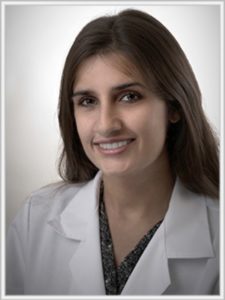India Reddy, M.D., Ph.D. (’18): Stahlman-Thomas Associate College Advisor
by Camille Wang (G3)
 Dr. India Reddy is a fourth year at Vanderbilt’s research track psychiatry residency program and a recent addition to the Stahlman-Thomas Associate College Advisors. She is from Glastonbury, CT, and she attended college at Cornell University before matriculating in the Vanderbilt MSTP program. There, she worked in the Galli lab doing basic neuroscience research. Now, she is looking forward to doing a fellowship at the University of Utah in addiction psychiatry this upcoming year.
Dr. India Reddy is a fourth year at Vanderbilt’s research track psychiatry residency program and a recent addition to the Stahlman-Thomas Associate College Advisors. She is from Glastonbury, CT, and she attended college at Cornell University before matriculating in the Vanderbilt MSTP program. There, she worked in the Galli lab doing basic neuroscience research. Now, she is looking forward to doing a fellowship at the University of Utah in addiction psychiatry this upcoming year.
Can you tell us about some of the transition points in your career path?
Some of the experiences I had in the MD-PhD program at Vanderbilt shifted my trajectory towards psychiatry – for instance, my mom is a psychiatry nurse, but I really didn’t know that this was what I wanted to do until I got into the research and the clinical experiences. But I allowed myself to be open and I did find the patient interactions to be quite rewarding.
In residency, I realized that I like my clinical work more than I realized in medical school, and I wanted to make that a greater part of my career. I think as a medical student, you get some good clinical experiences, but you don’t always feel like you’re responsible for the patients. But gaining that responsibility really changes your perspective on the clinical experience. I realized that I was really rewarded by working clinically. Now, I’m figuring out how I am going to merge research and medicine effectively, where I’m not being pulled in too many directions at once.
I’ve also shifted my research to a bit more translational – I’m working with big data, electronic health records, also some genetics type work which is very different from my PhD, which was very basic bench neuroscience
Why did you switch into dry lab? How was that research transition?
I wanted to do more clinical and translational work. It was definitely a challenge, especially during the pandemic – having to teach myself how to code, not being in a physical space and asking questions there. That was hard. There definitely was some time just spent learning and not really collecting data. I think that is something to consider if you switch fields – you’re going to be a little bit behind, and you probably won’t publish as much as you would if you stayed in the same kind of research you were doing.
I felt like there was a good reason to make this switch. It made sense with my interests but also logistically with the future career I wanted to have. I also think that this kind of research is amenable to a combination of research and clinical work. It’s more flexible – I can move more easily between clinical work and answering messages and then going back to coding or whatever I’m doing that day. That’s been a little bit helpful in moving my career trajectory in the direction I want it to go. So, it was worth it for me.
What led you to want to be an advisor?
I’ve been thinking in the back of my mind it’d be great to get involved in the MSTP again, and to remind myself what it was like back then, what the program has been able to give me, and to be able to give back that perspective. Being able to be there to have some of these conversations has been helpful for students, and also for myself to be able to reflect that I’ve made progress since then on my goals.
What else do you do with your time, outside of research and medicine?
I also do some teaching – starting in my second year of residency, I got involved with the clerkships on the motivational interviewing lecture every month. So I did that for two years. And then I’ve also been involved in the addiction ISC.
I’ve also stayed pretty connected with my hobbies despite being very busy. I think that’s one perk of psychiatry, that we do have some flexibility with free time. I still rock climb regularly, we go 2-3x/week to the gym. My husband and my friends and I go climbing outdoors around TN and KY.
Any advice or things that you wish you knew?
Sometimes, it’s easy to think that you should know things, but it’s also okay to say I don’t know things. I think my biggest piece of advice would be: don’t be afraid to reach out to people and to ask questions. It’s okay to look stupid sometimes. That’s how you advance.
